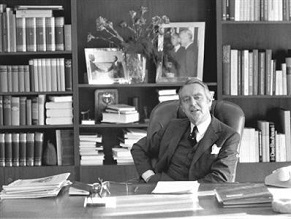|
World Jewish News

A German industralist, Berthold Beitz was officially recognised by Yad Vashem Holocaust Museum as a Righteous Among Nations in 1973.
|
Jewish groups lead tributes as Righteous Among Nations Berthold Beitz dies aged 99
01.08.2013, Jews and Society The World Jewish Congress led tributes to Righteous Gentile, WWII-era German industrialist Berthold Beitz who died in his native country Tuesday aged 99, as President Ronald S. Lauder paid tribute to him as “a beacon of hope in a sea of despair”.
Honouring him for his humanity in saving hundreds of Jews in modern-day Ukraine from Nazi extermination programs, he added that his acts had “earned the everlasting love and gratitude of the Jewish people”.
Comparing his wartime efforts to the more widely–reported acts of his contemporaries Oskar Schindler and Raoul Wallenberg, Lauder concluded: “He was a hero of the Holocaust at a time when it was a crime to be a humane person. He will never be forgotten for his tremendous acts of kindness.”
Beitz was officially recognised by Yad Vashem Holocaust Museum as a Righteous Among Nations in 1973. A German industrialist who worked for the Royal Dutch Shell Oil Company in Hamburg at the outbreak of war in 1939, his army service was deferred on account of his oil expertise and he was transferred to Boryslaw in modern-day Ukraine in 1941 to become manager of the Carpathian Oil Company.
It was in Boryslaw, home to a substantial Jewish community, that Beitz first witnessed the mass round-up of Jews by the Nazis, in particular the brutal evacuation of the town’s Jewish orphanage, which saw officers throw infants out of windows and drag children to deportation trains in the middle of the night. After the war, explaining his later actions, Beitz described himself as motivated by these sights, rather than any ideological opposition to Nazi ideology. “We watched from morning to evening as close as you can get what was happening to the Jews in Boryslaw. When you see a woman with her child in her arms being shot, and you yourself have a child, then your response is bound to be completely different,” he said in his testimony.
Like Schindler, Beitz had key connections with influential local Nazis from whom he learned of forthcoming Jewish round-ups and was entitled to remove his Jewish workers from the lists, as well as selecting qualified workers from the groups of Jews awaiting deportation. On one such occasion in August 1942, Beitz saved 250 Jewish men and women awaiting deportation to Belzec death camp, despite the fact that eyewitnesses later claimed that a large proportion of these were not fit for the purpose of oil production, rather showing signs of being in poor physical condition.
Beitz continued in this vein until 1944, when he was eventually drafted into the army. As well as saving Jews for professional purposes, Beitz and his wife Else also established a reputation for hiding escapee Jews in their own home during their stay in Boryslaw, which opened them up to being denounced to the Nazis. Else was eventually recognised as a Righteous Gentile for her role in this in 2006.
After the war, Beitz became CEO of German multinational ThyssenKrupp AG, returning to live in Duisburg and Essen in Germany.
by: Shari Ryness
EJP
|
|
